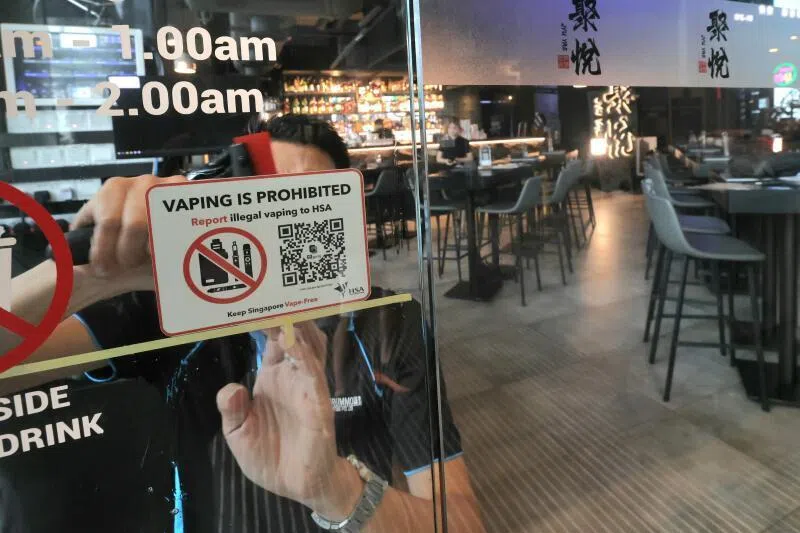NZ-based advocacy group that criticised Singapore’s anti-vaping policy denies links to Big Tobacco
Sign up now: Get ST's newsletters delivered to your inbox

The New Zealand-based Caphra has described Singapore’s anti-vaping policy as regressive and fearmongering.
PHOTO: LIANHE ZAOBAO
Follow topic:
- Caphra denies being a proxy for Big Tobacco, stating it operates transparently without financial ties or foreign funding and advocates for tobacco harm reduction.
- Minister K. Shanmugam criticised Caphra for pushing pro-vaping arguments and accused them of being a lobby group for Philip Morris International.
- Caphra argues Singapore's vaping ban drives consumers to unsafe black markets, mirroring experiences in other Asian countries with similar prohibitions.
AI generated
SINGAPORE – A vape advocacy group critical of Singapore’s anti-vaping policy has denied Home Affairs Minister K. Shanmugam’s claim
The New Zealand-based Coalition of Asia Pacific Tobacco Harm Reduction Advocates (Caphra) said it is not a traditional non-governmental organisation reliant on foreign funding or political agendas.
“We operate with full transparency, no bureaucracy and no financial ties – not even a bank account,” Caphra told The Straits Times in response to queries sent to the group’s executive coordinator Nancy Loucas.
The group added that it is made up of volunteers.
“We are disheartened by Minister Shanmugam’s personal remarks, especially given his stated priority of safeguarding Singaporeans’ health,” it said.
“The rise of dangerous adulterated products is a direct outcome of prohibition.
“This mirrors experiences across Asia – India, Thailand, Taiwan, China, Hong Kong and Australia – where bans on safer alternatives have driven consumers to unsafe underground markets rather than reducing harm.”
The group on Aug 18 described Singapore’s anti-vaping policy and enhanced measures, which were introduced following a spate of etomidate cases, as regressive and fearmongering.
Mr Shanmugam, who is also Coordinating Minister for National Security, hit back on Aug 30, saying the argument that the ban would drive vaping underground is the same one used by those who push for the legalisation of drugs.
He said Caphra’s members promote the use of electronic smoking devices such as vapes and heated tobacco products “under the banner of tobacco harm reduction”.
“You can put whatever label you like, but they are basically pushers of tobacco,” said the minister.
“And they seem to be a lobby group for a tobacco company called, most people know, Philip Morris International.”
Checks by ST using open-source information online showed that Caphra was previously affiliated with the International Network of Nicotine Consumer Organisations (Innco), which received grants from the Foundation for a Smoke-Free World.
The foundation – renamed the Global Action to End Smoking in 2024 – was funded by Philip Morris International.
Caphra and Innco collaborated in 2021 to oppose moves by international organisations such as the World Health Organisation and UN to introduce measures to tackle what they described as a tobacco epidemic.
Caphra, which was removed from Innco’s list of affiliates in 2023, said it had been advocating tobacco harm reduction long before the tobacco industry conceived of “smoke-free worlds”.
“They (tobacco industry) don’t like us very much because we have no filter, nor a reason not to call them out too when they behave badly,” the group said.
Several countries that regulate vaping have enhanced laws in recent years amid a rise in vape use, especially among the young.
These include Australia, which introduced a ban on the sale of vapes containing nicotine outside of pharmacies and an outright ban on disposable vapes from July 1, 2024.
The move followed criticism by medical experts in the country that the so-called “healthier” alternative to smoking was a “sleight-of-hand” move by the tobacco industry.
Australian Health Minister Mark Butler said then that the new regulations close a loophole, adding: “‘Big Tobacco’ has taken another addictive product, wrapped it in shiny packaging and added sweet flavours to create a new generation of nicotine addicts.
“We have been duped.”

A national study by Cancer Council Australia showed that the ban on disposable vapes had a positive effect, with vaping rates among 14- to 17-year-olds falling from 17.5 per cent at the start of 2023 to 14.6 per cent in April 2025.
Enhanced laws in Australia were also introduced amid a rise in criminality, with syndicates threatening and firebombing tobacco and vape shops to force them to sell illegal products, including vapes laced with nicotine or drugs.
Dr James Martin, criminology course director at Deakin University in Melbourne, said that since the start of 2023, there have been more than 220 arson attacks targeting either black-market retailers or store owners who refuse to stock illegal and cheaper tobacco products.
To report vaping-related offences, call the Health Sciences Authority hotline on 6684-2036 or 6684-2037 from 9am to 9pm daily, including public holidays. Reports can also be made online at www.go.gov.sg/reportvape
If you have a story to share about vapes, e-mail us at


